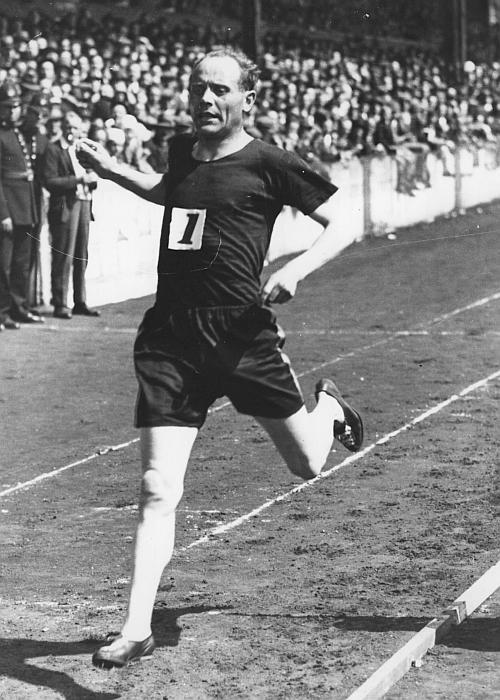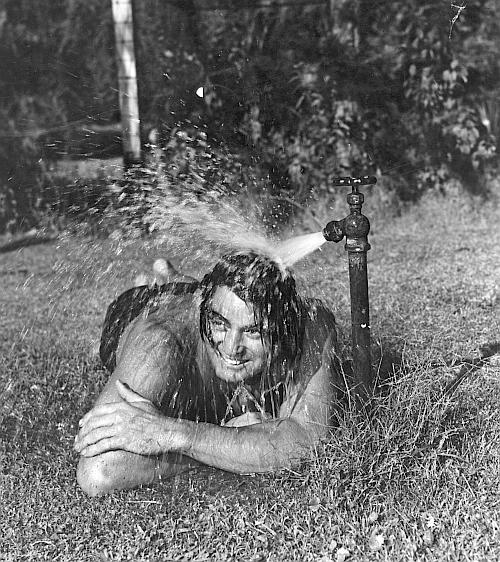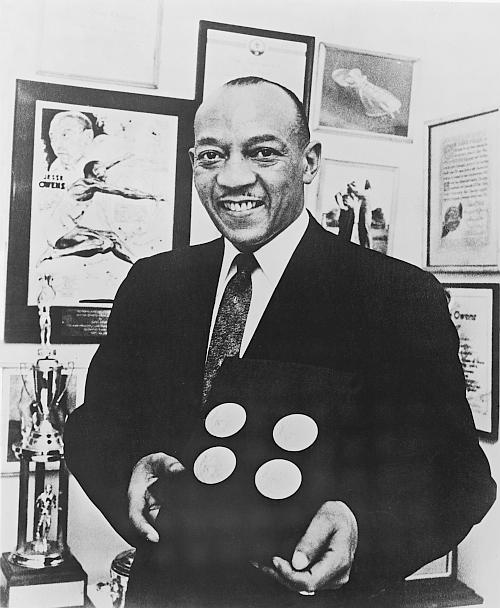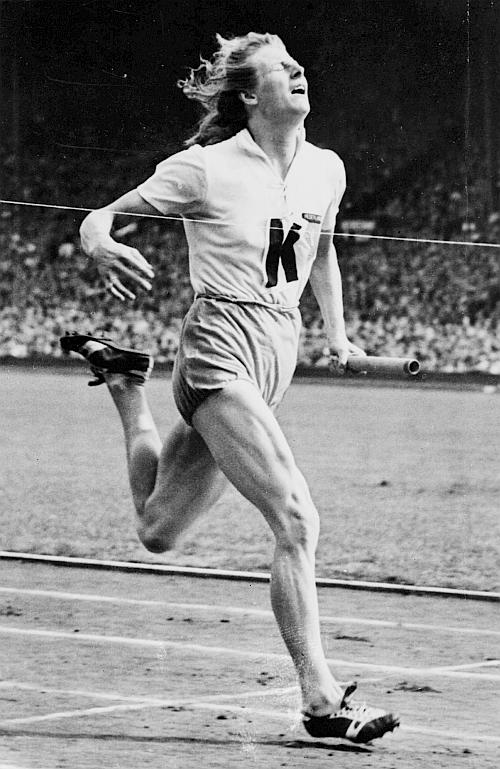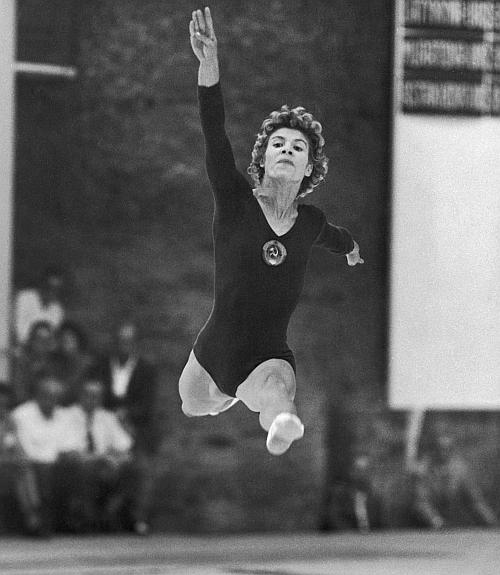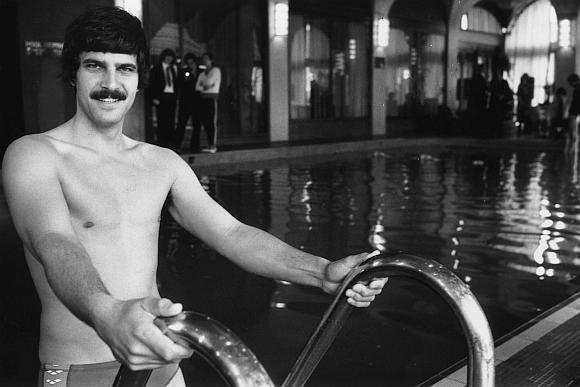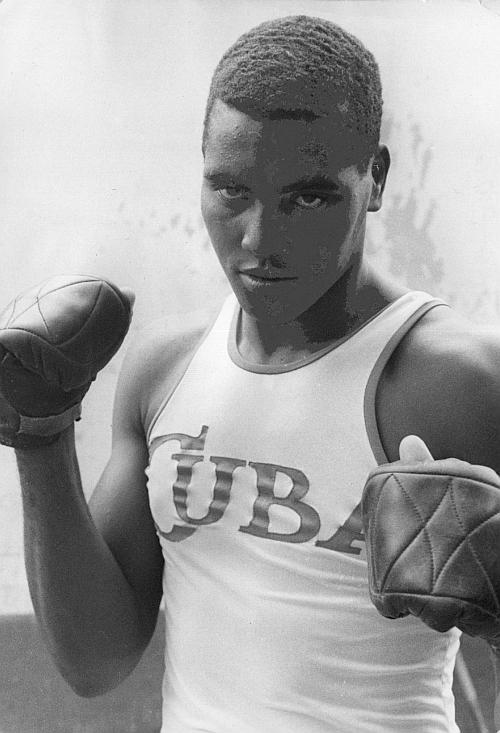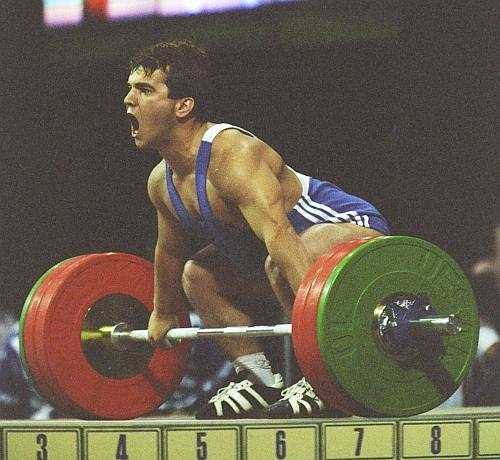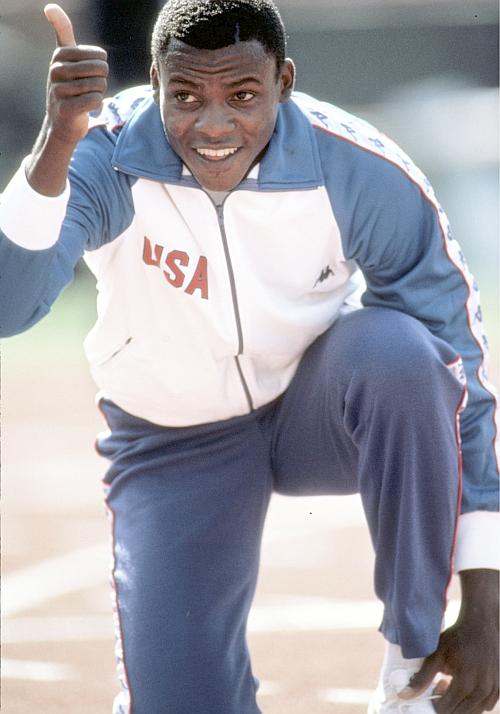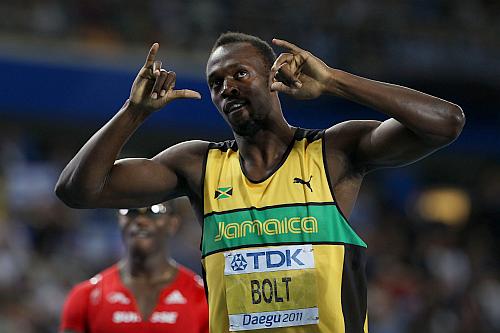 | « Back to article | Print this article |
Paavo Nurmi won a total of nine gold medals
The leading 12 Olympic athletes since the Games were revived in 1896.
Paavo Nurmi (Finland, 1897-1973)
Nurmi, the greatest of the "Flying Finns" who revolutionised distance running, was a solitary man whose obsessive training routine combining speed and endurance racing was years ahead of its time.
At the 1920 Antwerp Games Nurmi won gold medals in the 10,000 metres and in the individual and team cross country events.
He collected five more at the 1924 Paris Games and believed he would have won a sixth had the Finnish team allowed him to compete in the 10,000 metres. A ninth gold followed in the 10,000 metres at the Amsterdam Games four years later
Nurmi had plans to compete in Los Angeles in 1932 but he was declared a professional and became embittered in later life.
However, a fitting tribute was paid to the man who had set 29 world records when he bore the torch into the stadium at the 1952 Helsinki Games to tumultuous applause. A statue of Nurmi stands to this day outside the Olympic stadium.
Johnny Weissmuller won five gold medals in swimming
Johnny Weissmuller (United States, 1904-84)
Weissmuller, who took up swimming after contracting polio as a child, was the first person to break 60 seconds barrier for the 100 metres freestyle.
He won the 400 and 100 metres freestyle events at the 1924 Paris Olympics and retained the 100 title in Amsterdam four years later, finishing unbeaten with five Olympic titles and 67 world records.
After retiring from the pool, the finest male swimmer of the first half of the 20th century embarked on a Hollywood career, playing Tarzan alongside Maureen O'Sullivan as Jane.
The part required plenty of swimming, much swinging from trees, frequent Tarzan yells and minimal acting skills; all of which helped Weissmuller pay for a colourful lifestyle.
Jesse Owens dominated the Berlin Games
Jesse Owens (United States, 1913-80)
Grace and power combined to singular effect in Jesse Owens, who broke five world records and equalled a sixth within the space of an extraordinary hour in Ann Arbor, Michigan, on May 25, 1935.
At the Berlin Games in the following year, Owens equalled the Olympic record in winning the 100 metres, broke the Olympic record he had set in the early rounds in the 200 metres final and defeated the home favourite Lutz Long in the long jump.
Owens might not even have qualified for the final after two no jumps had Long not quietly advised him to set his marker back to ensure he recorded a valid jump.
His fourth gold medal came in controversial circumstances. At a Games watched by Adolf Hitler and his henchman, who exploited the propaganda opportunites afforded by an Olympics to the full, two Jewish members of the original 4x100 metres relay were excluded and Owens included in the winning quartet.
Owens corresponded with Lutz until the latter's death in World War Two. Although he and the other American "black auxiliaries" highlighted the evil of the Nazis' racial ideology, Owens himself struggled against racial prejudice at home where he discovered his achievements did not translate into steady employment.
Fanny Blankers-Koen: From motherhood to medals
Fanny Blankers-Koen (The Netherlands, 1918-2004)
Fanny Blankers-Koen had competed at the 1936 Berlin Games, finishing out of the medal places in the long jump and 4x100 metres relay.
By the time of the 1948 London Games she was 30-years-old and a mother, which according to the coventional wisdom of the times meant she had no chance even though she held seven world records.
Blankers-Koen silenced the sceptics and illuminated a Games held in war-ravaged Europe by winning the 100 and 200 metres, the 80 metres hurdles and anchoring her country to victory in the 4x400 metres relay.
She was fully extended in the hurdles only, edging Britain's Maureen Gardner who clocked the same time of 11.2 seconds, and returned home to become a fulltime housewife.
Larisa Latynina: A gymnast par excellence
Larisa Latynina (former Soviet Union, 1934-present)
Latynina endured the Nazi occupation of her native Ukraine and the premature death of her father to flourish as a gymnast in an era when balletic grace was still prized over athleticism.
Starting with the 1956 Melbourne Games, where she dueled with Hungarian Agnes Keleti, Latynina won a record 18 medals in three games for the erstwhile Soviet Union.
In Melbourne, Latynina beat Keleti in the all-round event, shared the floor gold with Keleti and won the vault. The Soviet Union won the team event.
She was equally successful in Rome (1960) and Tokyo (1964) and finished her Olympic career with nine golds, five silvers and four bronze medals.
Mark Spitz won seven gold medals in Munich
Mark Spitz (United States, 1950-present)
Mark Spitz's longish hair and luxuriant moustache displayed at the 1972 Munich Olympics contravened the conventional wisdom that all body hair needed to be shaven to ensure a faster passage through the water.
It certainly did not stop Spitz gathering a record seven gold medals in the 100 and 200 metres freestyle, the 100 and the 200 butterfly and three relays, each in world record time.
Spitz, a Jewish athlete who had competed at the Maccabiah Games in Tel Aviv in 1965, recorded his final victory hours before Palestinian guerrillas captured and eventually murdered 11 Israeli athletes. He left West Germany under armed guard and was unable to attend the closing ceremony.
In 1992 Spitz came out of retirement in an unsuccessful attempt to qualify for the Barcelona Olympics. At the of 41 his times were similar to his heyday but the world of swimming had moved on.
Teofilo Stevenson won three Olympic golds
Teofilo Stevenson (Cuba, 1952-present)
One dream boxing matchup that would remain stubbornly confined to the realms of fantasy was a fight during the 1970s between Muhammad Ali and Cuba's three-times Olympic heavyweight champion Teofilo Stevenson.
At the age of 20, Stevenson won his first gold medal at the 1972 Munich Olympics, the Games where Cuba first demonstrated they were a force in amateur boxing with their first three titles, plus a silver and a bronze.
Stevenson won on a walkover after his injured Romanian opponent Ioin Alexe failed to appear.
His second gold at the Montreal Olympics excited the interest of American promoters, who offered him $5 million to challenge Ali.
Stevenson, a national hero and personal favourite of Fidel Castro, rejected all inducements, asking each time: "What is $1 million compared to the love of eight million Cubans?"
In his prime, Stevenson was a lithe, athletic fighter with a solid left jab and punishing right hand who towered over his opponents. And by choosing not to box for money he did not suffer the permanent damage sustained by too many in the brutal professional trade, including Ali.
Naim Suleymanoglu became a legend in Turkey
Naim Suleymanoglu (Turkey, 1967-present)
Suleymanoglu, nicknamed "The Pocket Hercules", was to become a national hero in Turkey after he defected from Bulgaria at the 1986 world weightlifing championships in Melbourne.
Born in Pichar to ethnic Turks, Suleymanoglu was denied a certain gold medal at the 1984 Los Angeles Olympics when Bulgaria joined the eastern bloc boycott. His decision to defect followed repression of the Turkish minority with mosques closed and the Turkish language banned.
Suleymanoglu competed at the Seoul Olympics after Turkey had handed over $1 million dollars to Bulgaria to waive the nationality rules. He broke his world records for the snatch, clean and jerk and the total, and lifted more than three times his bodyweight overhead.
A million people greeted Suleymanoglu on his return and Bulgaria responded to international pressure by letting 300,000 Turks cross the border.
Carl Lewis won the long jump on four occasions
Carl Lewis (United States, 1961-present)
Sprinter and long jumper Carl Lewis set out to emulate his childhood hero Jesse Owens at the 1984 Los Angeles Olympics, a brash, commercial Games suffused with Hollywood pizzazz.
The young American was untouchable at the sun-drenched Coliseum after a slow start in the 100 final, which his coach reckoned had cost him a world record, and by the end of the Games was unquestionably the best track and field athete in the world.
Perhaps unwisely, Lewis's agent compared him to Michael Jackson and their open courting of commercial endorsements in a sport which had only just become professional rebounded when sponsors stayed away and the U.S. public perceived their new champion as aloof and arrogant.
Lewis never transcended his sport in the way he had hoped but the true measure of the man was his enduring excellence and unyielding competitive spirit. He won the Olympic long jump gold medal in four consecutive Games and by the time he had finished he had gathered nine Olympic and eight world titles.
Usain Bolt made history in Beijing
Usain Bolt (Jamaica, 1986-present)
Usain Bolt's boundless potential had been evident since his schooldays in Jamaica. A chronic back condition went unnoticed until after he had limped out of the 2004 Athens Olympics where he finished fifth in the first round heats of the 100 metres.
Successful medical treatment and a fresh training regime from new coach Glenn Mills transformed the laidback Jamaican's fortunes. Mills wanted Bolt to move from the 200 up to the 400; Bolt argued the case for dropping to the 100.
In the Olympic year of 2008, Bolt clocked 9.76 on his home track in Kingston, just two hundredths of a second outside compatriot Asafa Powell's world record in only his third competitive 100 metres race. He then reduced Powell's mark to 9.74 in New York.
All this was merely a prelude to the Olympic Games. In Beijing, Bolt clocked an astonishing 9.69 in the 100 final despite visibly slowing down in the final 20 metres. He then reduced Michael Johnson's 1996 world 200 record of 19.32, a time statisticians would last at least 25 years, by two hundredths of a second. The 4x100 relay world record was a formality.
At the Berlin world championships the following year, Bolt took his world records to another dimension. He clocked 9.58 in the 100 and 19.19 in the 200, slashing 11 hundredths of a second off both records. Johnson and other experts believe the lanky Bolt could now become the first man to hold the 100, 200 and 400 world marks.
Michael Phelps won a record eight golds in Beijing
Michael Phelps (United States, 1985-present)
Michael Phelps eclipsed Spitz by winning eight gold medals in eight events while setting seven world records at the Beijing Games. Phelps swam all four strokes to Spitz's two and if he had been a country he would have finished among the top 10 in the gold medals table.
He won gold in the 200 and 400 metres individual medley events, the 100 and 200 butterfly, the 200 metres freestyle and in three relays.
"He's the greatest swimmer of all time and the greatest Olympian of all time," said Spitz. "He's maybe the greatest athlete of all time."
Phelps said: "I wanted to do something nobody ever did. This goes hand in hand with my goal of changing swimming."
Possibly as a reaction to the ceaseless and rigorous training demands of his chosen sport, Phelps has run into trouble after both his Olympics in 2004 and 2008.
After Athens he pleaded guilty to driving under the influence of alcohol and after Beijing he was photographed at party with a marijuana pipe.
Spiridon Louis (Greece, 1873-1940)
On the recommendation of French linguist and historian Michel Breal the marathon was introduced at the first modern Games to celebrate the legend of Pheiddipides bringing news to Athens of victory over the Persians at the Battle of Marathon in 490BC.
Louis delivered spring water twice a day on his mule from the village of Maroussi to Athens and the stamina he built up made him a leading contender in the first Olympic marathon on the fifth day of the Athens Games.
The race captured the imagination of the Greeks, who turned out in their thousands and 60,000 within the Panathinaiko stadium erupted when Louis finished first to confirm the success of the fledgling Games.
Louis spurned the offer of a bride but accepted free meals and haircuts for life plus a plot of land.

© Copyright 2025 Reuters Limited. All rights reserved. Republication or redistribution of Reuters content, including by framing or similar means, is expressly prohibited without the prior written consent of Reuters. Reuters shall not be liable for any errors or delays in the content, or for any actions taken in reliance thereon.
